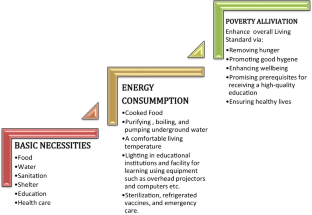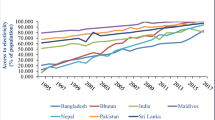Abstract
This research work contributes to the literature by examining the role of energy consumption in mitigating poverty via decomposing energy consumption into its positive and negative components, covering the period spanning from 1985 to 2017. To accomplish this objective, this study employs the nonlinear autoregressive distributed lag (NARDL) approach recently popularized by Shin et al., (2014). The NARDL approach is well-suited to our study becuase of its capability to delineate hidden asymmetries. The empirical findings reveal the prevalence of long-run associations among the studied variables. The outcomes show that an increase (decrease) in energy consumption combats (augments) poverty in Pakistan. The empirical findings underscore that the decreasing effect of energy consumption on poverty is found to be more promising than its increasing effect, both in the long and short run. Based on the empirical outcomes, we suggest that the policymakers, and other stakeholders should consider the asymmetric or nonlinear behavior of the studied variables for better poverty policy-making in Pakistan.
Graphical Abstract





Similar content being viewed by others
Data availability
The datasets used and/or analyzed during the current study are available from the corresponding author upon reasonable request.
References
Abdur Khorshed A (2010) Nexus between electricity generation and economic growth in Bangladesh. Asian Soc Sci 6(12):16–22
Ali H, Sharif I (2020) Investment, Poverty and Growth Nexus in Pakistan: Empirical Evidence from ARDL Modeling Approach to Co-Integration. J Quant Methods 4(1):154–177
Alam S (2010) Globalization, Poverty and environmental degradation: sustainable development in Pakistan. J Sustain Dev 3(3). https://doi.org/10.5539/jsd.v3n3p103
Alhassan AK, Okwanya I, Moses O (2015) Economic linkages between, energy consumption and poverty reduction: implication on sustainable development in Nigeria. Int J Innov Soc Sci Humanit Res 3(2):1131–1120
Ang JB (2007) CO2 emissions, energy consumption, and output in France. Energy Policy 35(10):4772–4778
ADB (2010) Clean energy in Asia: case studies of ADB investments in low-growth. ADB, Manila
Antai AS, Udo AB, Ikpe IK (2015) A VAR analysis of the relationship between energy consumption and economic growth in Nigeria. J Econ Sustain Dev 6(12):1–12
Bazelian M, Yumkella K (2015) Why energy poverty is the real energy crises. World Economic Forum. Available at: http://www.weforum.org. Accessed 25 Dec 2022
Betto F, Garengo P, Lorenzoni A (2020) A new measure of Italian hidden energy poverty. Energy Policy 138:111237. https://doi.org/10.1016/j.enpol.2019.111237
Bildirici M, Türkmen NC (2015) Nonlinear causality between oil and precious metals. Resour Policy 46:202–211. https://doi.org/10.1016/j.resourpol.2015.09.002
Black P (2003) Assessment for learning: putting it into practice. Open University Press, Buckingham, UK
Boukhatem J (2016) Assessing the direct effect of financial development on poverty reduction in a panel of low- and middle-income countries. Res Int Bus Financ 37:214–230
Dhaoui A, Chevallier J, Ma F (2020) Identifying asymmetric responses of sectoral equities to oil price shocks in a NARDL model. Stud Nonlinear Dyn Econom 0(0).https://doi.org/10.1515/snde-2019-0066
Dollar D, Kraay A (2001) Growth is good for the poor. J Econ Growth 7. https://doi.org/10.1023/A:1020139631000
Dubois U (2014) Energy consumption and poverty reduction in Africa. Afr J Sustain Dev 2(16). https://www.iaee.org/en/publications/proceedingsabstractpdf.aspx?id=12324
Farid A, Rehman N, Farid K (2016) Growing external debt in Pakistan and its implication for poverty. J Soc Sci Hum 1(1 & 2):55–71
Gillani YM, Rehman H, Gill RA (2009) Unemployment, poverty, inflation and crime nexus: co-integration and causality analysis of Pakistan. Pakistan Econ Soc Rev 47(1):79–98
Goozee H (2018) Energy, poverty and development: a primer for the sustainable development goals: Working Paper International Policy Centre for Inclusive Growth (IPC-IG), Brasilia
Harrison A (2006) Globalization and poverty. National Bureau of Economic Research working paper (No. w12347)
Holmberg S, Rothstein B, Nasiritousi N (2009) Quality of government: what you get. Annu Rev Polit Sci 12:135–161
Hosier RH, Dowd J (1987) Household fuel choice in Zimbabwe: an empirical test of the energy ladder hypothesis. Resour Energy 9:347–361
Hussein MA, Filho WL (2012) Analysis of energy as a precondition for improvement of living conditions and poverty reduction in Sub Saharan Africa. Sci Res Essays 7(30):2656–2666
Janvry AD, Sadoulet E (2016) Development economics: theory and practice. Routledge, Taylor and Francis Group, London
Kaidi N, Mensi S (2019) Financial development, income inequality, and poverty reduction: democratic versus autocratic countries. J Knowl Econ. https://doi.org/10.1007/s13132-019-00606-3
Kakar KZ, Khilji AB, khan JM (2011) Globalization and economic growth: evidence from Pakistan. Acta Universitatis Danubius. Economica 7(3)
Karim KM, Zouhaier H, Adel BH (2013) Poverty, governance and economic growth. J Gov Regul 2(3):19–24
Kaygusuz K (2011) Energy services and energy poverty for sustainable rural development. Renew Sustain Energy Rev 15(2):936–947 (Elsevier)
Kheir VB (2018) The nexus between financial development and poverty reduction in Egypt. Rev Econ Political Sci. https://doi.org/10.1108/reps-07-2018-003
Khobai H (2020) Renewable energy consumption and unemployment in South Africa. Int J Energy Econ Policy
Kousar S, Ahmed F, Pervaiz A, Zafar M, Abbas S (2020) A panel co-integration analysis between energy consumption and poverty: new evidence from South Asian countries. Stud Appl Econ 38(3)
Kroon BVD, Brouwer R, Van Beukering PJH (2013) The energy ladder: theoretical myth or empirical truth? Results from a meta-analysis. Renew Sustain Energy Rev 20:504–513. Retrieved from: https://www.sciencedirect.com/science/article/pii/S1364032112006594. Accessed 12 Nov 2022
Kwon HJ, Kim E (2014) Poverty reduction and good governance: examining the rationale of the millennium development goals. Dev Chang 45(2):353–375
Leach G (1992) The energy transition. Energy Policy 20(2):116–123. https://doi.org/10.1016/0301-4215(92)90105-b
Legros G, Havet I, Bruce N, Bonjour S (2009) The energy access situation in developing countries: a review focusing on the least developed countries and Sub-Saharan Africa. World Health Organ 142:32–1
Majeed MT (2011) Trade, poverty and employment: empirical evidence from Pakistan. Forman J Econ Stud 2011(6):103–117
Masera OR (2000) From linear fuel switching to multiple cooking strategies: a critique and alternative to the energy ladder model. World Dev 28(12):2083–2103
Mogale TM (2005) Local governance and poverty reduction in South Africa (I). Prog Dev Stud 5(2):135–143
Moses OK, Okwanya I, Alhassan A (2015) Economic linkages between, energy consumption and poverty reduction: implication on sustainable development in Nigeria. Int J Innov Soc Sci Humanit Res 3(2):1131–1120
Murtaza G, Faridi MZ (2015) Causality linkages among energy poverty, income inequality, income poverty and growth: a system dynamic modelling approach. JSTOR 54(4):407–425
Nkomo J (2017) Energy use, poverty and development in the SADC. J Energy Southern Afr 18(3):10–17
Odhiambo NM (2010a) Is financial development a spur to poverty reduction? Kenya’s experience. J Econ Stud 37(3):343–353
Odhiambo NM (2010b) Finance-investment-growth nexus in South Africa: an ARDL-bounds testing procedure. Econ Change Restruct 2010(43):205–219
Okwanya I, Abah PO (2018) Impact of energy consumption on poverty reduction in Africa. CBN J Appl Stat 9(1):105–139
Paolo F, Enrico S (2006) Openness, economic reforms, and poverty: globalization in developing countries. J Dev Areas 39(2): 129–151. Retrieved July 15, 2020, from https://www.jstor.org/stable/4193008
Pesaran MH, Shin Y, Smith RJ (2001) Bounds testing approaches to the analysis of level relationships. J Appl Economet 16(3):289–326
Qadir N, Majeed M (2018) Does trade openness cause marginalization in Pakistan? Pakistan Econ Rev (Summer 2018):30–51
Rana S (2016) Forty percent Pakistanis live in poverty. The express tribune. https://tribune.com.pk/story/1126706/40-pakistanis-live-poverty. Accessed 03 Dec 2022
Rahman ZU, Ahmad M (2019) Modeling the relationship between gross capital formation and CO 2 (a) symmetrically in the case of Pakistan: an empirical analysis through NARDL approach. Environ Sci Pollut Res 26:8111–8124
Roddis S (2000) The role of women in the traditional energy sector: gender inclusion in an energy project. Africa Region Findings and Good Practice Infobriefs; No. 152. World Bank, Washington, DC. https://openknowledge.worldbank.org/handle/10986/9848
Sakanko MA, David J (2018) The relationship between poverty and energy use in Niger State. UMYUK J Econ Dev 1(3):139–154. Retrieved from https://www.researchgate.net/publication/330713455. Accessed 06 Nov 2022
Santos DS, Hino AAF, Höfelmann DA (2019) Iniquities in the built environment related to physical activity in public school neighborhoods in Curitiba, Paraná State, Brazil. Cad Saude Publica 35(5):e00110218. https://doi.org/10.1590/0102-311x00110218
Sarker AE, Rahman MH (2007) The emerging perspective of governance and poverty alleviation: a case of Bangladesh. Public Organiz Rev 7(2):93–112
Shin Y, Yu B, Greenwood-Nimmo M (2014) Modelling asymmetric cointegration and dynamic multipliers in a nonlinear ARDL framework. In W. Horrace, and R. Sickles (Eds.), The Festschrift in Honor of Peter Schmidt.: Econometric Methods and Applications (pp. 281–314). Springer. https://doi.org/10.1007/978-1-4899-8008-39
Siddique H, Majeed M, Shehzadi I (2019) Impact of political instability on economic growth, poverty and income inequality. Pakistan Business Review 20:825–839
Saddique T, Saleem R, Ullah A, Amjad M (2022) The moderating role of PER capita income in energy consumption-poverty nexus: empirical evidence from Pakistan. 002190962211060. https://doi.org/10.1177/00219096221106091
Sovacool BJ (2012) The political economy of energy poverty: a review of key challenges. Energy Sustain Dev 16(3):272–282
Tsaurai K (2021) Energy consumption-poverty reduction nexus in BRICS Nations. Int J Energy Econ Policy
Toda HY, Yamamoto T (1995) Statistical inference in vector autoregressions with possibly integrated processes. J Econom 66(1–2):225250. https://doi.org/10.1016/0304-4076(94)01616-8
Umair A, Abdul G, Awan DA (2019) Impact of globalization on poverty in Pakistan. 5:624-644
UNDP (2012) Energy to move rural Nepal out of poverty: the rural energy development programme model in Nepal. UNDP, Kathmandu. United Nations Development Program
United Nation Development Program (2007) Making globalization work for all. Retrieved from https://www.undp.org/publications/undp-annual-report-2007
United Nations Development Programme (1954) Statistics of the human development report. UNDP 1954
WIN (2005) Household energy, indoor air pollution and health impacts: status report for Nepal. Kathmandu: Winrock International Nepal
World Bank (1985) Energy assessment status report: Nepal. World Bank, Washington, DC. (Report No. 028/84). The World Bank
World Bank (2015) Pakistan Country Profile. Washington, DC: World Bank. Available at http://Data.Worldbank.Org/Country/Pakistan. Accessed 02 Oct 2022
World Bank (2003) Energy and poverty reduction: proceedings from a multi-sector and multi-stakeholder workshop - how can modern energy services contribute to poverty reduction? World Bank, Washington, DC
World Bank (2018) The World Bank Annual Report Washington, DC: World Bank. https://openknowledge.worldbank.org/handle/10986/30326. Accessed 3 Oct 2022
World Health Organization (2006) The world health report working together for health. Retrieved from https://www.who.int/whr/2006/whr06_en.pdf. Accessed 10 Oct 2022
Yasmin B, Jehan Z, Chaudhary MA (2006) Trade liberalization and economic development: evidence from Pakistan. Lahore J Econ 11(1)
Yousaf H, Ali I (2014) Determinants of poverty in Pakistan. Int J Econ Empir Res (IJEER) 2(5):191–202
Author information
Authors and Affiliations
Contributions
TS conceived the idea, wrote original draft, and finished formal analysis. RS supervised the article and contributed towards conceptual and computational part of the study. AU and AAAB revised the literature review section and verified the methodology. All authors discussed the results and reviewed and finalized the draft.
Corresponding author
Ethics declarations
Ethics approval
Not applicable.
Consent to participate
Not applicable.
Consent for publication
Not applicable.
Competing interests
The authors declare no competing interests.
Additional information
Responsible Editor: Roula Inglesi-Lotz
Publisher's Note
Springer Nature remains neutral with regard to jurisdictional claims in published maps and institutional affiliations.
Rights and permissions
Springer Nature or its licensor (e.g. a society or other partner) holds exclusive rights to this article under a publishing agreement with the author(s) or other rightsholder(s); author self-archiving of the accepted manuscript version of this article is solely governed by the terms of such publishing agreement and applicable law.
About this article
Cite this article
Saddique, T., Saleem, R., Ullah, A. et al. Exploring the impact of energy consumption on poverty in Pakistan: evidence from the asymmetric ARDL approach. Environ Sci Pollut Res 30, 120250–120265 (2023). https://doi.org/10.1007/s11356-023-30494-9
Received:
Accepted:
Published:
Issue Date:
DOI: https://doi.org/10.1007/s11356-023-30494-9




